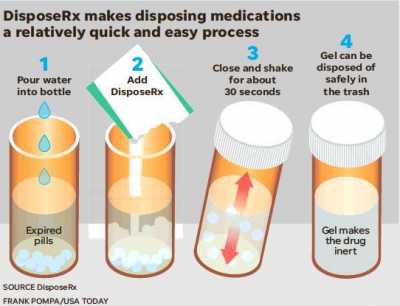
26 Jun Walgreens DisposeRx Program Will Provide Free Drug Disposal System at Pharmacies
MedicalResearch.com Interview with:
John Holaday, PhD
Chairman and CEO of DisposeRx
Dr. Holaday discusses the recentannouncement that Walgreen’s has added DisposeRx to its safe medication drop off kiosks.
MedicalResearch.com: What is the background for this study? How big is the problem of unused risky medications leftover after the need or indication period has passed?
Response: Keeping leftover medications in the home significantly increases the risk of accidental poisonings as well as diversion, which can lead to addiction, overdoses and death. According to the Centers for Disease Control & Prevention (CDC), accidental medicine poisonings send nearly 60,000 children under 5 years old to emergency rooms annually. And, a study by the National Institute on Drug Abuse found that the first opioid used by 70% of individuals with heroin-use disorder was a prescription pain medication, often remaining in their medicine cabinet well after the pain subsided and then a remaining temptation for abuse.
This is a pervasive problem across the country. In an independent survey DisposeRx sponsored, it was found that 4 out of 10 Americans are keeping leftover prescriptions—including opioids – in their medicine cabinets. Other results of the survey include: 62% of respondents who said they stored medications in case a condition returns; and 37% said they save prescription drugs in case a friend or family member needs them.
These consumers need to be educated about all the potential harm resulting from saving leftover medications. Leading pharmacy chains such as Walgreens are committed, as responsible corporate citizens, to making DisposeRx available upon request for their customers and to educate them about its use in getting rid of leftover drugs before they cause harm. Walgreens sees value in adding DisposeRx at-home solution to its comprehensive medication management and opioid stewardship programs as an additional method to reduce risks and exposure.
MedicalResearch.com: How successful have the drop off kiosks been to date? How will the DisposeRx be implemented? i.e., through UPS? USPS?
Response: All methods of ridding medicine cabinets of leftover drugs are important and educating patients about the problems must be accompanied by a solution….one that encourages them to do something by changing their behavior. Kiosks are a great tool for collecting drugs, but as demonstrated by the partnership with Walgreens, they need to be part of a multi-pronged solution to combat the opioid crisis. Kiosks require more effort from the consumer—packing up the prescriptions and driving to the pharmacy’s kiosk. However, there’s a difference between “collecting” and “disposing.” DisposeRx is an eco-friendly at-home disposal solution that renders drugs unavailable in their medicine vial, and it is given…without charge…at the pharmacy counter when the medications are dispensed. DisposeRx is not a mail-back program that requires mailing UPS or USPS. What makes DisposeRx so unique and powerful is that it targets the problem at the root cause, instead of adding additional steps to safe medication disposal. DisposeRx-treated drugs are simply discarded in the trash, ending up in landfills where they slowly degrade.
MedicalResearch.com: What should readers take away from your report?
Response: As part of its commitment to the wellbeing of its patients and community, Walgreens has taken a very important step by distributing DisposeRx at the pharmacy counter and educating patients about its use. In addition to kiosks in their stores, DisposeRx provides Walgreen’s customers with an at-home solution to specifically help combat the opioid epidemic by decreasing the risks associated with leftover medications, specifically poisonings and overdoses.
MedicalResearch.com: What recommendations do you have for future research as a result of this work?
Response: Making pharmacists and consumers aware of the lifecycle of a prescription is vitally important. In the past, a prescribing healthcare practitioner or physician would give a prescription to the patient, and they would use the drug as the doctor recommended. There is a growing awareness that simply dispensing drugs isn’t enough to ensure the patient’s safety; there is also an urgent need to educate both the dispensing pharmacist and his or her patient about how to neutralize and discard the leftover medications at the end of the prescription’s lifecycle. By giving patients convenient alternatives at the pharmacy counter, we are solving the question of “what do I do with my leftover medications” and― together with our pharmacy partners―bringing the solution to the problem.
MedicalResearch.com: Is there anything else you would like to add?
Response: With the addition of Walgreens as a distribution partner, there are now millions of DisposeRx packets available to consumers by simply asking their pharmacist. I cannot stress enough how important it is to dispose of leftover medications in an eco-friendly way. Now, in addition to take-back programs and kiosks, with DisposeRx, consumers have a more convenient option as they help to make their homes and communities safer from the hidden dangers of leftover drugs.
[wysija_form id=”3″]
[last-modified]
The information on MedicalResearch.com is provided for educational purposes only, and is in no way intended to diagnose, cure, or treat any medical or other condition. Always seek the advice of your physician or other qualified health and ask your doctor any questions you may have regarding a medical condition. In addition to all other limitations and disclaimers in this agreement, service provider and its third party providers disclaim any liability or loss in connection with the content provided on this website.
Last Updated on June 26, 2019 by Marie Benz MD FAAD


